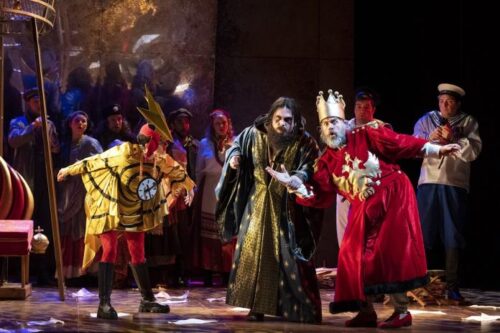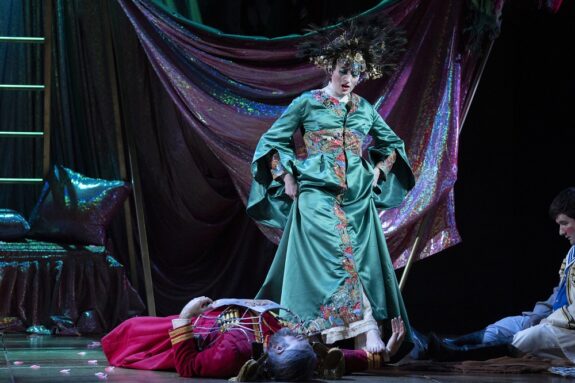 United Kingdom Rimsky-Korsakov, The Golden Cockerel: Soloists, Chorus and Orchestra of English Touring Opera / Gerry Cornelius (conductor). Hackney Empire. London, 5.3.2022. (CC)
United Kingdom Rimsky-Korsakov, The Golden Cockerel: Soloists, Chorus and Orchestra of English Touring Opera / Gerry Cornelius (conductor). Hackney Empire. London, 5.3.2022. (CC)

Production:
Director – James Conway
Designer – Amelia Jane Hankin
Set & Costume designer – Neil Irish
Lighting designer – Rory Beaton
Cast:
King Dodon – Grant Doyle
Prince Gvidon – Thomas Elwin
Prince Afron – Jerome Knox
General Polkan – Edward Hawkins
Amelfa – Amy J Payne
The Astrologer – Robert Lewis
The Queen of Shemakha – Paula Sides
The Golden Cockerel – Alys Mererid Roberts
Rimsky-Korsakov’s 1907 ‘acted parable’ based on a fairy-tale by Pushkin, Skazka o zolotom petushke to a libretto by Vladimir Ivanovich Belsky – usually known by its French title, Le coq d’or, and heard here in English as The Golden Cockerel – premiered on October 7, 1909 (posthumously) in Moscow. Fairy-tale it might be, but relevant it certainly was. A tale of invasion, reactions and consequences, it bears its military side right from the off with its opening trumpet fanfares. Here it is Russia that is being invaded; Rimsky’s opera is a barely concealed parody of Nicholas II’s humiliating defeat in the Russo-Japanese War.
This performance was dedicated to the people of the Ukraine, and to the Russian people who support peace; it should be borne in mind that Rimsky supported the 1905 uprising and was fired for his post at the Saint Petersburg State Conservatory because of it. The evening became highly emotionally charged – a powerful reminder not only of the power of music per se, but also of the transcendent power of fairy-tale to speak to us on deep levels (the writer Marina Warner has explored this in detail in her works). Via fantastical storytelling, Rimsky satirises the last days of the Romanov Empire – his scoring is as brilliant as one might expect (try the wonderfully piping oboe melody that opens the third scene of the first act (Dodon, Amelfa, Cockerel), and how Rimsky darkens the atmosphere through low wind and string soon thereafter as one of a multitude of examples. The piece was heard in an ‘orchestral adaptation’ by Iain Farrington (two horns, single bassoon, one oboe doubling cor anglais and so on, a total of 27 players, with strings 6:4:2:2:1).
James Conway’s production is a little miracle itself, mixing frolicking fairy-tale with more profound moments. Bold colours and fanciful costumes darken somewhat in the depiction of Russian revolutionary uniforms; hardly surprising that the ‘citizens are anxious about the consequences of the war’ at the start of the final act.
The staging reflected the many moods in vibrant colours that fitted this voyage into the world of fairy-tale perfectly – a three-way collaboration between set and costume designers Amelia Hankin and Neil Irish, and superb lighting from Rory Beaton. The Golden Cockerel herself sang initially from a lookout tower, from which she could warn the King and his retinue of oncoming invaders; battlefields inevitably took us to darker territories and lightings. The somewhat compact Hackney Empire stage is intelligently used throughout (I imagine that, on the forthcoming tour, ETO might have to deal with smaller, though).
The English translation was by Antal Dorati and James Gibson and is a riot, full of clever rhyming duplets.
There was no insert to tell us that the difficult and technically challenging role of the Astrologer was sung by Robert Lewis (he is omitted from the cast list, although one can find the information hidden at the back of the programme), a shame as it was an awesome – not an Americanism – assumption of the role: powerful, eloquent, superb, with an emphasis on the vocally powerful. One should bear in mind that Rimsky’s writing for this character is pitiless. Lewis is a tenor to watch (he sings Parpignol in the La bohème which tours with this). King Dodon (pronounced the French way) features the strong-voiced baritone Grant Doyle, who sports a variety of costumes including some amusing underwear (it has to be said, there is a fair amount of working with the phallic symbolism of artillery in the production; while I am on the subject – an adult fairy-tale, then). Doyle was an exceptional Forester (The Cunning Little Vixen last year at Opera Holland Park (review), and before that as Robert in Iolanta (review); he owned the authority of his role here while embracing the King’s faults and frequent silliness. His housekeeper-cum-nanny Amelfa is superbly taken by ample-voiced mezzo-soprano Amy J Payne.

Impossible to ignore is the role of the Golden Cockerel itself, and it was taken in spectacular fashion by soprano Welsh soprano Alys Mererid Roberts, a recent graduate of the Royal Academy Opera Programme. Asked to sing cruelly coloratura writing, Roberts has a gleaming, agile high soprano voice that is perfect for the part. The other major female part is Queen Shemakha, one of only two characters the Astrologer in his epilogue tells us is ‘real’ (the other being the Astrologer himself), and this was a staggering interpretation by Tennessee-born Paula Sides (who shares the role with Luci Briginshaw, who takes over on April 27 and May 10). It is Queen Shemakha who dominates the second act, and Sides was terrific both dramatically (great presence) and vocally – she sounded properly seductive. This is ‘her’ act, and Sides owned it (a nice idea too to have a sign carried across the stage for the end of the second act and then ‘Act III’).
One of the most amusing, almost pantomime, characters was the General Polkan of Edward Hawkins. He absolutely embraced every facet of his character, held within a fine bass voice. A name to watch – his CV is embryonic but there is much to look out for here. With the two Princes ably taken by Thomas Elwin and Jerome Knox (Gvidon and Afron respectively), this production, without doubt, is cast from strength.
Interesting to think that on the other side of the globe, in Adelaide, Australia, Le coq d’or is similarly in the midst of a sequence of performances as part of the Adelaide Festival. The director there is one Barrie Kosky – one doesn’t know quite what to imagine, and that’s what makes opera so vibrant and alive today. But English Touring Opera’s Golden Cockerel is a triumph. This Hackney performance launched a countrywide tour for Cockerel and La bohème, moving first to Poole (March 11) stretching all the way to Ulverston on June 3, with eleven venues en route. Catch it while you can!
Colin Clarke
